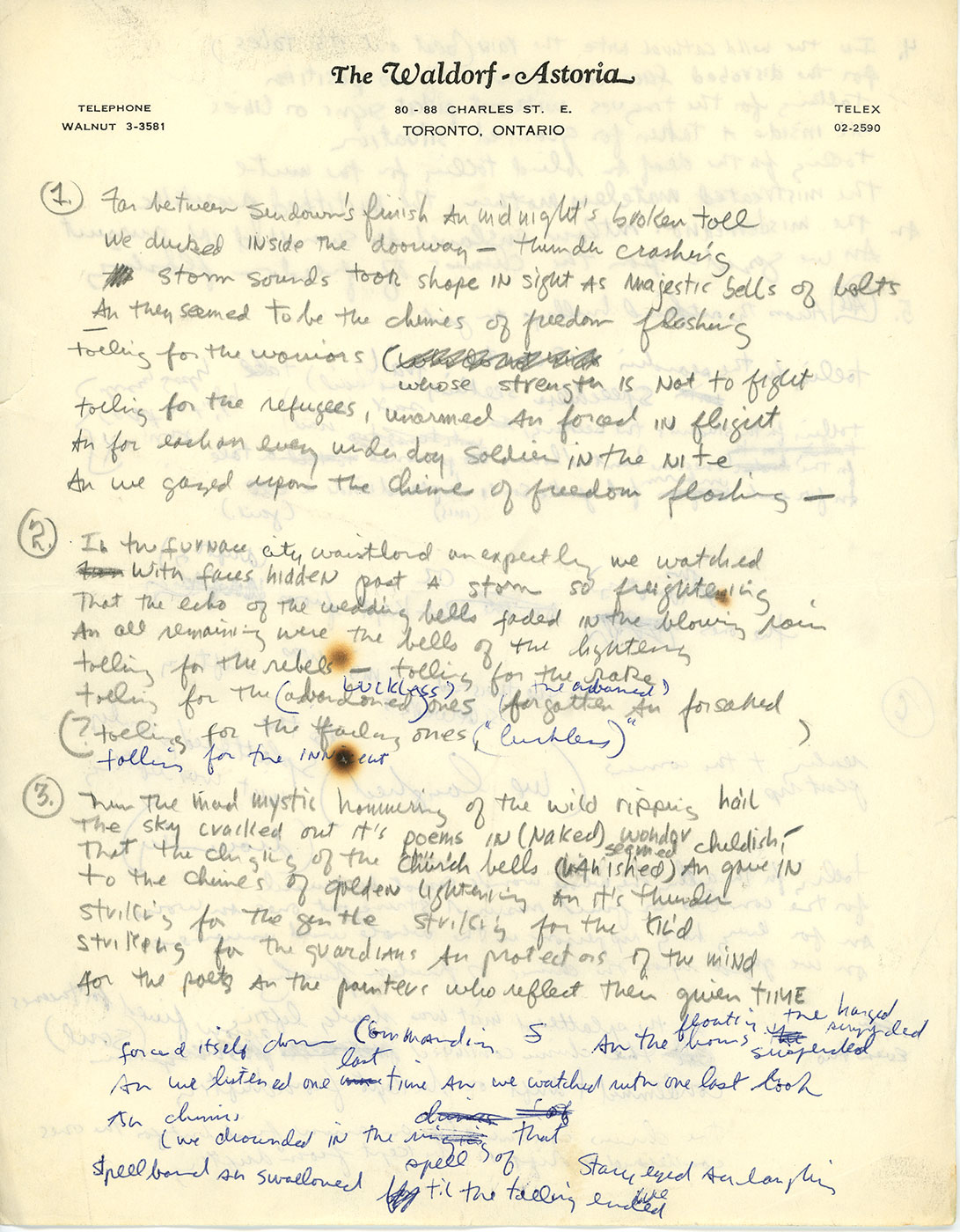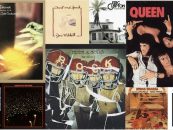The Bob Dylan Archive has officially opened its doors to qualified entities and individuals who wish to access the archive’s elements spanning nearly 60 years of Dylan‘s life and career. The Bob Dylan Center will be dedicated to the study and appreciation of Dylan and is located in Tulsa, Oklahoma’s downtown Brady Arts District.
Since elements of the Bob Dylan Archive began arriving in Tulsa a year ago, a significant portion of the collection has been processed through proprietary methods of storage, cataloguing and digitization. While the processing work continues and early access to the archive has been granted to some researchers, staff will officially begin making substantial parts of the collection available to qualified researchers, writers and scholars this fall.
The archive’s contents include handwritten manuscripts, notebooks and correspondence; films, videos, photographs and artwork; memorabilia and ephemera; personal documents and effects; unreleased studio and concert recordings; musical instruments and many other elements. Agencies interested in submitting proposals for the center should go here.
The collection contains some 6,000 items spanning 60 years associated with Dylan and now residing in the home state of the prominent singer-songwriter’s early icon, Woody Guthrie. In 2016, the University of Tulsa (TU) in conjunction with the George Kaiser Family Foundation (GKFF) purchased the archive that includes decades of never-before-seen handwritten manuscripts, notebooks and correspondence; films, videos, photographs and artwork; memorabilia and ephemera; personal documents and effects; unreleased studio and concert recordings; musical instruments and many other items.
Related: John Hammond: The “Lost” Interview (Signing Dylan)
The alliance of GKFF and TU was chosen by Dylan’s representatives over other suitors vying for this historic collection. Items from the Bob Dylan Archive have already been brought to TU’s Hardesty Archival Center inside the Helmerich Center for American Research – which is affiliated with Tulsa’s prestigious Gilcrease Museum – where they are being digitized and preserved by a digital curation team for eventual public exhibition and academic access.
Among them are:
A notebook from 1974 containing Dylan’s handwritten lyrics to songs that were eventually recorded for the artist’s biggest-selling album, Blood On The Tracks, including “Tangled Up In Blue,” “Simple Twist Of Fate” and “Idiot Wind.”
Sketches, writings and edits from Tarantula, Dylan’s 1965 groundbreaking collection of experimental poetry.

Dylan’s handwritten lyrics to “Chimes of Freedom”
Dylan lyrics and chord progressions for unrecorded songs, circa 1970.
Lyrics to “Chimes Of Freedom,” handwritten by Dylan in 1964 on hotel stationary, complete with annotations and additional verses.
Handwritten notes from Dylan and director Howard Alk, detailing editing notes and shot selects from the films Eat The Document (1971) and Renaldo And Clara (1978).
Dylan’s 1962 signed contract with Witmark Music, his first music publisher.
Dylan’s 1966 wallet containing numerous inserts, including paper with Johnny Cash’s address and phone number, as well as a business card from Otis Redding.
Complete, never-released Dylan concert films from Toronto’s Massey Hall in 1980 and New York’s Supper Club from 1993.
Dylan’s earliest music recordings from 1959.
The leather jacket worn by Dylan onstage at The Newport Folk Festival in 1965, the year he “went electric.”
The surviving harp from inside the piano on which Dylan composed “Like A Rolling Stone.”
In-progress and final lyrics to all songs from Dylan’s latter-day masterpiece, Time Out Of Mind, handwritten and annotated by the artist.
Related: Dylan to tour the U.S. this summer
A curator and advisory committee for The Bob Dylan Archive will be installed soon, and initial plans call for a public exhibition and academic access to the collection later this year. Ultimately, a permanent exhibit space for The Archive will be designated near the Woody Guthrie Center in Tulsa’s Brady Arts District, which houses a museum dedicated to American folksinger and Oklahoma native Woody Guthrie.
At the time of the original announcement, Dylan said, “I’m glad that my archives, which have been collected all these years, have finally found a home and are to be included with the works of Woody Guthrie and especially alongside all the valuable artifacts from the Native American Nations. To me it makes a lot of sense and it’s a great honor.”
Don’t miss a post! Sign up for Best Classic Bands‘ Newsletter; form is on every page.
- Supertramp Gets 2026 Half-Speed Remasters - 01/25/2026
- Peter Gabriel Surprises With 2026 Album, o\i - 01/25/2026
- 1974: The Year in Rock Music - 01/24/2026







No Comments so far
Jump into a conversationNo Comments Yet!
You can be the one to start a conversation.